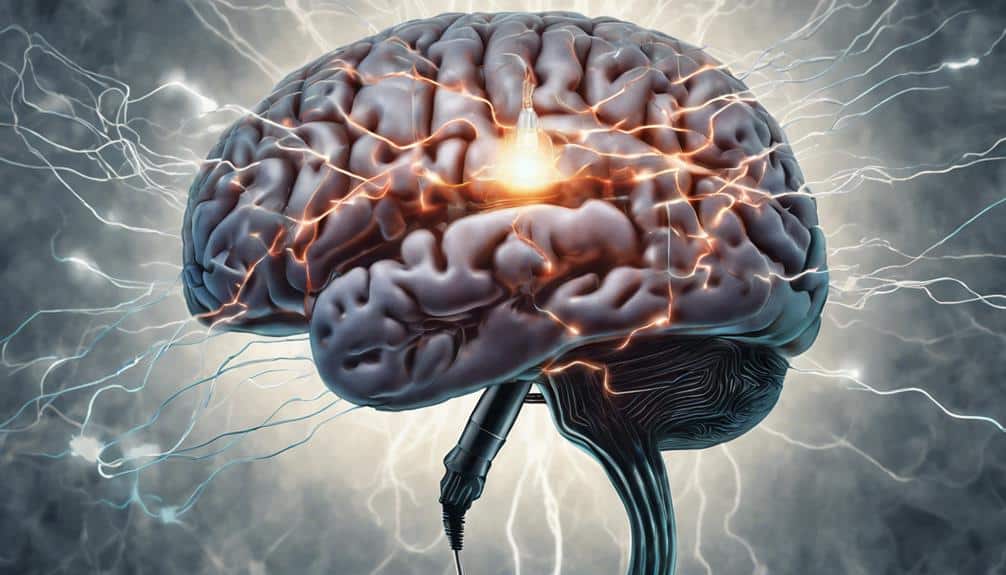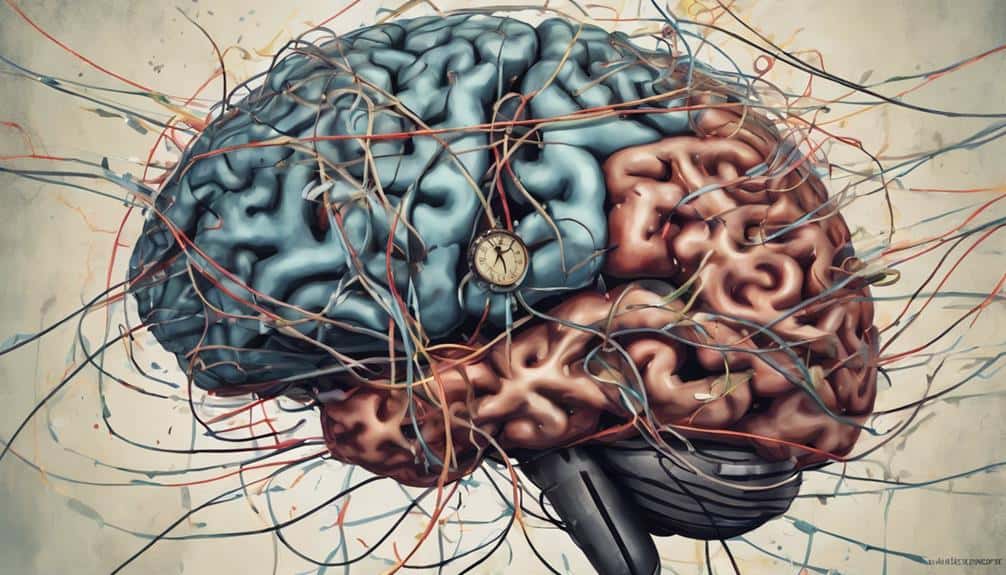Does Adhd Cause Hypersexuality
As someone exploring the complexities of ADHD, it may come as a surprise that hypersexuality is a topic of interest in this domain.
The relationship between ADHD and heightened sexual behaviors is a nuanced one, with various factors at play.
Understanding how impulsivity and fixation tie into the equation can shed light on the potential connection between ADHD and hypersexuality.
Stay tuned to uncover the intricate interplay and implications of this intriguing association.
Key Takeaways
- ADHD can lead to heightened sexual desires and behaviors.
- Impulsivity in ADHD fosters risky sexual behaviors.
- Dopamine differences in ADHD brains may influence hypersexuality.
- Tailored treatment plans combining therapy and medication are crucial for managing hypersexuality in ADHD.
Potential Link Between ADHD and Hypersexuality

Frequently, studies have indicated a potential correlation between ADHD symptoms and engaging in higher risk sexual behaviors. Individuals with ADHD may exhibit symptoms such as impulsivity and hyperactivity, which can contribute to engaging in risky sexual behaviors.
While hypersexuality isn't a direct symptom of ADHD, some individuals with the condition report experiencing heightened sexual desires and behaviors. This association between ADHD and risky sexual behaviors could be linked to differences in dopamine levels in the brain, affecting reward processing and self-regulation mechanisms.
Research suggests that individuals with ADHD may engage in earlier initiation of sexual activity and have more sexual partners compared to those without the condition. Understanding the interplay between ADHD symptomatology and hypersexuality is complex and requires further investigation to determine the specific mechanisms and associations underlying these behaviors.
Existing Research on ADHD and Hypersexuality

Existing research on ADHD and hypersexuality suggests a significant correlation between the two, indicating potential implications for individuals with ADHD. Studies have consistently shown that individuals with ADHD are more likely to engage in risky sexual behaviors, such as having multiple sexual partners and participating in casual sex. Additionally, the severity of ADHD symptoms appears to play a role in the extent of risky sexual behaviors, with higher levels of ADHD symptoms correlating with increased engagement in high-risk sexual activities.
Research has indicated that childhood ADHD may be linked to the early initiation of sexual activity, highlighting a potential association between the onset of ADHD and sexual behavior. The impulsivity often seen in individuals with ADHD, attributed to dysregulation of dopamine in the brain, may contribute to the increased likelihood of engaging in hypersexual behaviors. While findings regarding the exact nature of the relationship between ADHD and hypersexuality may vary, more extensive and diverse studies are needed to establish conclusive results in this area.
Factors Contributing to Hypersexuality in ADHD

Impulsivity and hyperactivity in ADHD can significantly contribute to hypersexuality by fostering risk-taking behaviors. Low dopamine levels in individuals with ADHD may lead them to seek out increased stimulation, potentially manifesting as hypersexual behaviors.
Research suggests a correlation between ADHD symptoms and engaging in risky sexual activities, underscoring the need to explore how impulsivity and distractibility in ADHD can intensify hypersexual tendencies.
ADHD and Impulsivity
The impulsiveness commonly seen in individuals with ADHD can greatly contribute to engaging in risky sexual behaviors. ADHD individuals may struggle with inhibiting impulses, leading to impulsive sexual decisions.
This impulsivity can manifest in seeking immediate gratification, including in sexual contexts where individuals with ADHD might engage in risky sexual practices. The impaired impulse control associated with ADHD can influence the development of hypersexual behaviors.
When impulsivity isn't adequately managed, it can contribute to a pattern of engaging in impulsive sexual activities without considering potential consequences. Understanding how ADHD and impulsivity are linked can shed light on the factors that contribute to hypersexuality in individuals with ADHD.
Dopamine and Hypersexuality
Individuals with ADHD exhibit unique dopamine processing patterns that may contribute to the development of hypersexuality in this population.
- ADHD brains process dopamine differently, potentially impacting pleasure experiences.
- Lower levels of dopamine transporters in individuals with ADHD might influence their sex drive.
- Dopamine-seeking behaviors may be more appealing to those with ADHD, contributing to hypersexuality.
- Research suggests a connection between dopamine regulation and hypersexuality in individuals with ADHD.
Understanding these dopamine-related factors in ADHD brains can shed light on the complexities of hypersexuality in this population. By delving into the nuances of dopamine functioning, we gain insight into the interplay of neurological processes and behavioral tendencies that underlie hypersexual behaviors in individuals with ADHD.
Impact of ADHD on Sexual Behavior
ADHD can greatly influence sexual behavior, impacting aspects such as libido, impulsivity, and relationship dynamics.
Studies have shown a correlation between ADHD and engaging in risky sexual activities, often due to symptoms like impulsivity and hyperactivity.
Understanding how ADHD affects sexual behavior is important in providing appropriate support and interventions for individuals dealing with hypersexuality.
ADHD and Libido
Impulsively seeking out sexual encounters, individuals with ADHD often experience an elevated libido that can influence their sexual behavior.
- Increased sexual desire is correlated with ADHD.
- ADHD symptoms like impulsivity and hyperactivity contribute to hypersexuality.
- Those with ADHD may engage in riskier sexual behaviors due to impulsivity.
- ADHD is linked to a higher number of sexual partners and earlier sexual activity initiation.
The prevalence of hypersexuality is higher in individuals with ADHD, although it isn't a direct symptom of the condition. Understanding the correlation between ADHD and risky sexual behaviors can help in developing targeted interventions to address these challenges effectively.
Impulsivity and Sex
The impact of impulsivity on sexual behavior in individuals with ADHD manifests in risky decision-making and a tendency towards immediate gratification. This impulsivity can lead to engaging in risky sexual behaviors like unprotected sex or having multiple partners.
Individuals with ADHD may struggle to inhibit impulses related to sexual activities, resulting in impulsive decisions without contemplating consequences. The drive for immediate gratification due to impulsivity can contribute to hypersexuality in ADHD, with individuals seeking instant pleasure without weighing long-term implications.
The impulsive nature of ADHD can influence sexual behavior by potentially increasing sexual activity and engaging in risk-taking behaviors. It's essential to ponder how impulsivity in ADHD can impact various aspects of sexual encounters and decision-making processes.
Relationship Challenges
Relationship dynamics for individuals with ADHD can be significantly impacted by challenges stemming from impulsivity, inattention, and hyperactivity affecting their sexual behavior.
- Risky Sexual Behavior: Impulsivity in ADHD can lead to engaging in risky sexual behaviors, jeopardizing intimate relationships.
- Increased Sexual Partners: Studies suggest that individuals with ADHD may have a higher number of sexual partners, influencing relationship dynamics.
- Emotional Connection: Hypersexuality in ADHD can result in a preoccupation with sexual thoughts, potentially hindering the emotional connection with sexual partners.
- Maintaining Intimate Relationships: Understanding how ADHD symptoms influence sexual behavior is important for addressing relationship challenges and fostering healthy intimacy.
Addressing Hypersexuality in ADHD Treatment

Addressing hypersexuality in ADHD treatment involves understanding how ADHD symptoms like impulsivity and hyperactivity contribute to risky sexual behaviors. Individuals with ADHD may experience higher rates of hypersexuality, although ADHD itself doesn't directly cause this behavior.
Treatment strategies for hypersexuality in ADHD often include cognitive-behavioral therapy to manage impulsive behaviors related to sexual activity. Additionally, stimulant medications prescribed for ADHD can help individuals focus and potentially reduce impulsivity, indirectly impacting hypersexuality.
Collaborating with healthcare providers to tailor treatment plans and monitor progress is essential in effectively addressing hypersexuality in individuals with ADHD. By targeting impulsivity and hyperactivity through a combination of therapy and medication, healthcare providers can help individuals with ADHD better manage their symptoms and reduce the occurrence of risky sexual behaviors associated with hypersexuality.
Understanding Hypersexuality in ADHD Community
Understanding the intersection of ADHD and hypersexuality sheds light on the complex relationship between impulsivity, hyperactivity, and risky sexual behaviors within the ADHD community. When considering hypersexuality in the ADHD context, several key points emerge:
- Increased Sex Drive: Individuals with ADHD may experience heightened sexual impulses and desires, leading to an increased sex drive compared to the general population.
- Risky Sexual Behavior: Studies have shown a correlation between ADHD symptoms and engaging in higher-risk sexual behaviors, highlighting how impulsivity and hyperactivity can manifest in risky sexual choices.
- Early Sexual Activity Initiation: Childhood ADHD is linked to initiating sexual activity at a younger age and having a higher number of sexual partners, indicating a potential association between ADHD and precocious sexual behavior.
- Dopamine Influence: The role of dopamine, a neurotransmitter linked to reward and pleasure, in both ADHD and sexual behavior suggests a potential mechanism through which hypersexuality may occur in some individuals with ADHD.
Frequently Asked Questions
Does ADHD Cause Horniness?
Feeling horny with ADHD can stem from enhanced sexual impulsivity due to impulsivity and hyperactivity. This can affect relationships, emotional regulation, and cognitive focus. Dopamine levels and self-control are vital, and treatment options address neurological differences and societal stigmas.
What Medication Is Used for Hypersexual Adhd?
When managing hypersexual symptoms in ADHD, effective medications like methylphenidate and atomoxetine are prescribed. Dosage adjustments under healthcare supervision are essential. Additional therapy options, lifestyle changes, and support groups also contribute to long-term management.
Do People With ADHD Fantasize More?
I often find myself lost in sexual daydreams and vivid imaginations. My ADHD leads to excessive fantasies, intense thoughts, and forbidden fantasies. These private yearnings consume my mind with passionate reveries and imagined scenarios.
Do People With ADHD Have Urges?
I experience sexual impulses related to ADHD, affecting control, relationships, and social boundaries. Challenges include emotional regulation and self-awareness. Coping mechanisms, therapy, and communication skills help manage urges. Peer support is crucial in maneuvering these complexities.
Conclusion
To sum up, while ADHD isn't a direct cause of hypersexuality, there's a clear association between the two. Understanding the potential link between ADHD and heightened sexual behaviors is important for individuals and their partners.
By communicating openly, setting boundaries, and seeking support, those affected by ADHD can navigate challenges that may arise.
Just as a ship needs a steady hand to navigate rough waters, individuals with ADHD can steer their course with mindfulness and understanding.







